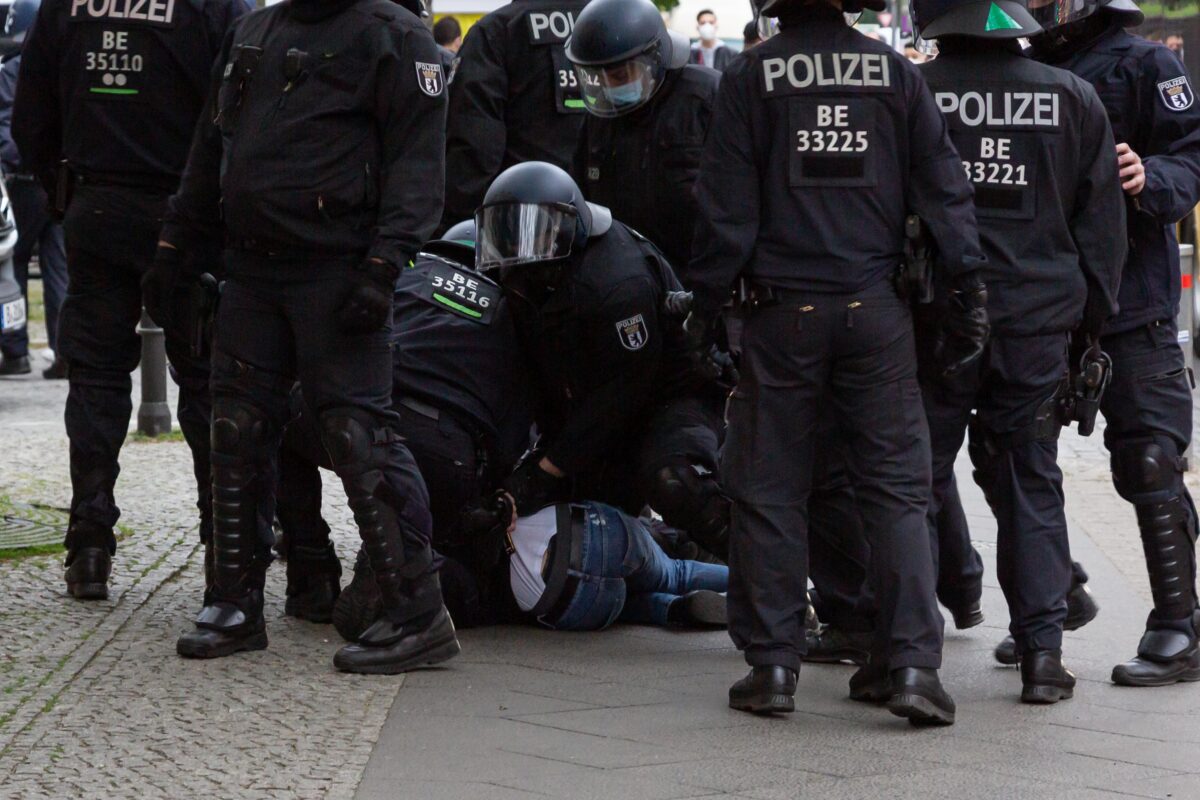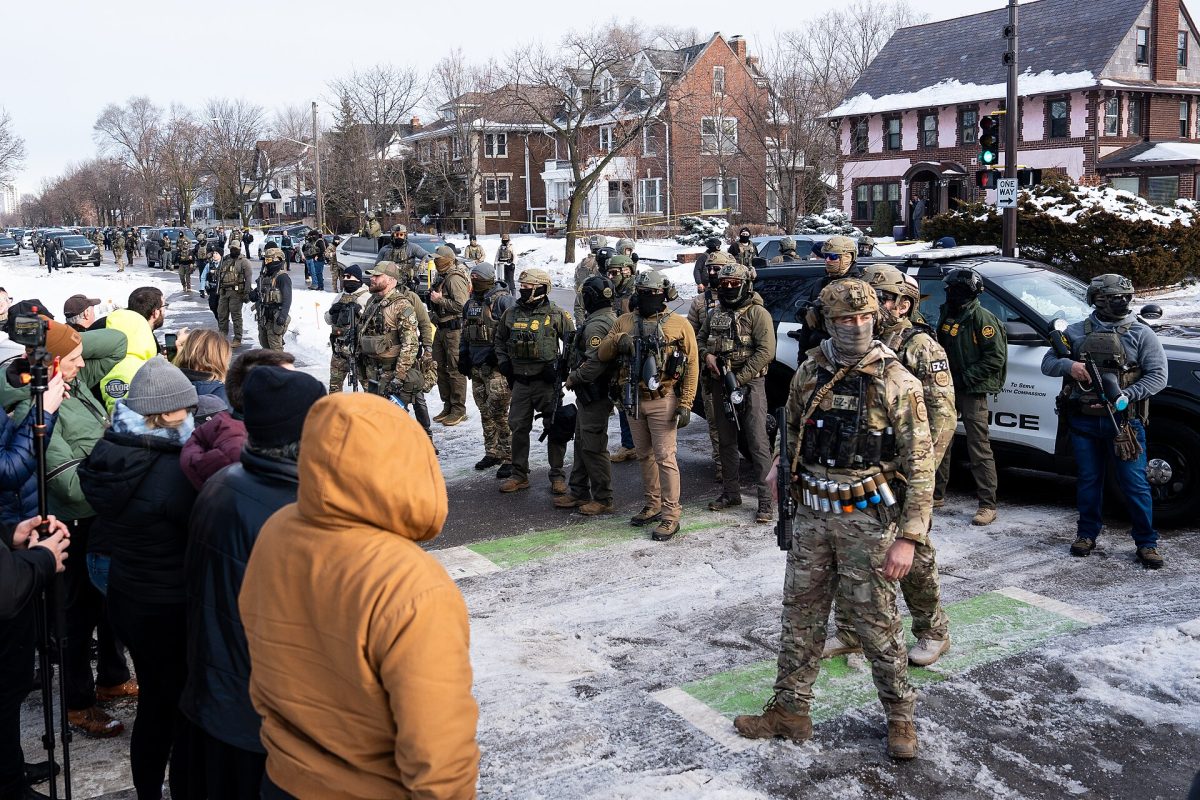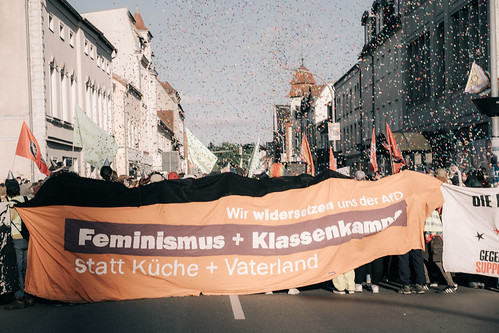It’s a constant drumbeat on social media; an image of police repression is followed by the comment: “This is fascism.” Is it, though?
The sentiment is easy to understand. In the United States, we see the Trump administration breaking laws and defying courts to send immigrants to a concentration camp in El Salvador. People are getting fired, assaulted, and even deported for voicing opposition to the genocide in Gaza. The same thing is happening in Germany.
Clearly, these are attacks on democratic rights. And isn’t fascism the opposite of democracy?
To start, we should be clear about what “democracy” is. We could also refer to it as the democratic form of a bourgeoisie dictatorship. Even if most people get to vote, society’s wealth remains in the hands of an infinitesimally small minority—the capitalist class. Every capitalist state exists to protect the bourgeoisie’s interests, using a plethora of tools. From police to media to schools, every state employs some mixture of consent and violence.
In other words, every bourgeois state, even the most democratic one, relies on repression. The term fascism refers to something very specific—it’s not a catch-all term for every right-wing, authoritarian government.
Trotsky’s Definitions
I am in a reading group that has been discussing a 1932 pamphlet by Leon Trotsky: What Next? Vital Questions for the German Proletariat. Trotsky highlights that fascism is based on mass mobilization of the middle classes against the working class: “At the moment that the ‘normal’ police and military resources of the bourgeois dictatorship, together with their parliamentary screens, no longer suffice to hold society in a state of equilibrium—the turn of the fascist regime arrives. Through the fascist agency, capitalism sets in motion the masses of the crazed petty bourgeoisie and the bands of declassed and demoralized lumpenproletariat—all the countless human beings whom finance capital itself has brought to desperation and frenzy.”
In other words, fascism relies on paramilitary forces that supplement the “normal” violence of the bourgeois state by terrorizing workers and oppressed people. The goal is the complete annihilation of any form of working-class self-organization, and the atomization of the oppressed. To once more quote Trotsky, “After fascism is victorious, finance capital gathers into its hands […] all the organs and institutions of sovereignty, the executive, administrative, and educational powers of the state: […] When a state turns fascist, […] it means, primarily and above all, that the workers’ organizations are annihilated; that the proletariat is reduced to an amorphous state.”
This distinction is important, as Trotsky continues, “Fascism is not merely a system of reprisals, of brutal force, and of police terror. Fascism is a particular governmental system based on the uprooting of all elements of proletarian democracy within bourgeois society.”
There are fascist gangs in the U.S., and they are growing, as there are in Germany. These gangs are part of Trump’s coalition, just as Germany’s far-right party AfD has myriad links to Nazis. Yet the Far Right internationally is building its power primarily via electoral parties, mobilizing supporters as voters, not as soldiers of counter-revolution.
The current situation, with Trump in the U.S. and the new right-wing chancellor Friedrich Merz in Germany, cannot really be compared to fascism as it was established in 1933. It has a lot more in common with the “presidential cabinets” that ruled Germany from 1930 to 1933. The right-wing chancellors that preceded Hitler—Brüning, Papen, and Schleicher—circumvented parliament to apply brutal austerity measures combined with equally brutal repression. They paved the way for Hitler—but relied on the capitalist state apparatus to implement their policies, and not on fascist private armies.
Fascism is not the bourgeoisie’s preferred form of government—a parliament or a congress are genuinely useful tools for the capitalists to hash out the differences among themselves, and an all-powerful Führer is usually too erratic. It’s only when the bourgeoisie faces a truly existential crisis that it is willing to consider handing over power to fascist thugs. For one final quote from Trotsky: “The big bourgeoisie likes fascism as little as a man with aching molars likes to have his teeth pulled.”
Why It Matters
Some might find this whole column pedantic. Who cares if we are under fascism proper, or under governments paving the way for fascists?
We should care, because the establishment of fascist dictatorships by paramilitary gangs would be a crushing defeat. It would make it impossible for us to discuss and organize openly—this website would not exist openly, nor would Marxist reading groups.
But we haven’t been defeated yet. To claim that we have lost the battle before the fighting has really gotten going can only disorient and demoralize us. A misdiagnosis makes it impossible to treat a disease.
This happened Back in the early 1930s, when the Stalinist leadership of the Communist Party of Germany (KPD) declared that fascism was already in power. What difference would it make if Brüning’s fascism was replaced by Hitler’s fascism, they asked, as both stood for starvation and unemployment.
This prevented the KPD from developing a strategy to stop the Nazis’ rise — and it turned out that it made a huge difference whether the KPD could work with certain legal rights under a bourgeois-democratic system, or whether the Nazis imprisoned all communists in concentration camps.
Centrists Help the Right
Today, the excessive use of the term fascism is often a justification for an alliance with a supposedly “anti-fascist” wing of the bourgeoisie. We are told to vote for the Democrats (or for the conservative CDU in Germany) because, despite their right-wing policies, they are at least not fascist.
This lesser-evilism ignores the fact that the Dems (and the CDU) have already adopted and implemented many of Trump’s (and the AfD’s) policies. It was centrists like Obama who built up the deportation machine that Trump is using.
Leftists, including politicians like Bernie and AOC, who campaign for status quo in order to “stop fascism,” end up justifying racist policies and austerity measures. This ultimately drives even more people into the arms of the Far Right, since the Right appears to be the only alternative to a hated neoliberal establishment.
Finally, if we are already living under fascism, it means that all workers’ organizations have become fascist as well. We see the millionaire bureaucrats that run our unions failing to stand up for the interests of our class—which means opposing every deportation and the entire far-right agenda. Yet despite their bureaucratic leaderships, unions still form a foundation of working-class power, and a potential starting point for real struggles. Fascism would aim to destroy unions—and we need to fight to mobilize unions against the Right, instead of writing them off.
Right-wing governments and fascist gangs are a concrete threat to immigrants, queer folks, and other oppressed groups. We need organized self-defense against this terror. Just like in the 1930s, we cannot rely on bourgeois courts or police.
To really stop fascism in its tracks, though, we need all working-class organizations to form a united front. This must start with a defense of democratic and social rights, but cannot stop there. We need to fight against the capitalist system with its inevitable crises, which forms the social basis of fascism. This means fighting for a program to guarantee jobs, housing, healthcare, and education for all, regardless of their “legal” status.
Fascism remains a mortal threat as capitalism slides ever deeper into crisis. But we cannot confront that threat if we don’t have a scientific understanding of it. If we define Trump or Merz as fascist, we would need to apply the same label to their predecessors, Biden and Scholz, who ruled under the same bourgeois-democratic regimes and were equally eager to repress and deport people. If they are also fascists, then every capitalist government in history would be fascist as well. And that would rob the term of any meaning, and us of any clarity about the situation we face.
Red Flag is a weekly column on Berlin politics that Nathaniel Flakin has been writing since 2020. After moving through different homes, it now appears on Friday at The Left Berlin.




